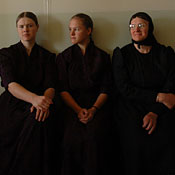- REVIEW
- READER REVIEWS
Silent Light
|
|
Genre
Drama
Producer
Carlos Reygadas, Jaime Romandia
Distributor
Bac Films
Release Date
Jan 7, 2008
Official Website
Review
In the hushed Mennonite adultery drama Silent Light, the shots drag on and on and the nonactors internalize everything. The Mexican director Carlos Reygadas is attempting to induce a state of transcendence, and his approach sometimes works, because what’s onscreen is so ponderously strange, and because you have to surrender to the movie to keep from going buggy. Reygadas is an art-house hot dog, a festival darling, and a brute—although this film is Brief Encounter compared to his last film, Battle in Heaven, which opened with an expressionless fat man being fellated in grisly close-up. Here, the director keeps you at arm’s length for so long that when the characters finally express themselves (maybe an hour and 45 minutes in), the impact is thunderous. See pious, plain, stoic Mennonites emote.
After a prologue in which the sun takes its time coming up and you try to slow your biorhythms, Reygadas cuts to a North Mexican farmhouse, where a large, German-speaking Mennonite family eats a silent breakfast. Well, it’s not precisely silent. The clock is ticking loudly. And from outside come barbaric noises—roosters, banshee cries, cows that bellow as if bats are chewing on their flesh. It’s Night of the Living Dead out there. The father, Johan (Cornelio Wall Fehr), is sunk in himself, the mother, Esther (Miriam Toews), stricken. “Esther, I’m going to pick up the crankshaft.” “Johan, we’re going out, too.” Johan remains at the table and then drives a ways to pick up the crankshaft. There is a long shot through his windshield. (Can there be a moratorium in art movies on windshield shots?) He confesses to a friend that he’s seeing another Mennonite woman, and the friend offers a surprising view: Johan’s obsession, he says, “might be founded in something sacred, even if we don’t understand it.” Buoyed, Johan drives in circles listening to what sounds like a polka; then suddenly he’s standing on a hilltop gazing rapturously into the eyes of Marianne (Maria Pankratz), the wind lifting her hair and the sunlight dappling the camera lens.
This is all rather studied, but Reygadas follows it with an earthy yet radiant scene in which Johan is back with his family, bathing in a creek: A little blonde girl dangles her legs and flashes the camera a look of enchantment; Johan shampoos another daughter’s hair while Esther massages her feet with rapt concentration. This is the antithesis of that so-called sacred adultery: the rough holiness of family life. When the washing stops (“Come, Esther, let’s go swim”), the camera stays put, the background blurred, until a pink flower slowly comes into focus. The Times’ Manohla Dargis loved that shot for its “metaphoric resonance”; I felt a metaphoric allergy to metaphors coming on.
But it’s hard to dismiss Reygadas entirely. At times, his images suggest a tension between the hard but ephemeral physical world and the eternal spirit. Esther tells Johan that, robbed of his love, she no longer feels a part of the physical world, and she staggers into a chilly downpour and sobs from her depths. Her fragile body is crumbling before his eyes. What has Johan done to this good, loyal wife and mother? The helplessness rips you apart.
If my judgment of Silent Light wavers, it’s because I don’t think Reygadas is inside his material. The bogusness of that blurry blossom haunts me: Faces are masks, metaphors upstage people. Johan is a big baby—he doesn’t grow, he has no stature. Marianne turns out to be more symbol than woman. The finale is a crowd-pleaser, but it’s shameless, like Tinkerbell dropping into a Lars von Trier picture. This director is too calculating to hold our trust for long, and skepticism will kill transcendence every time.
